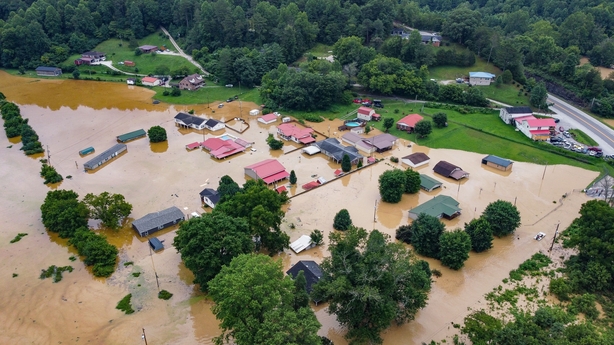At least 26 people, including children, have died in floods caused by torrential rains in eastern Kentucky, and more fatalities are expected, the state's governor Andy Beshear has said.
"Our death toll has risen to 26 lost – and that number will increase. There is widespread damage with many families displaced and more rain expected throughout the next day," the governor wrote on Twitter early on Sunday.
Police and National Guard troops, including personnel from neighbouring states, have been using helicopters and boats to rescue dozens of people from homes and vehicles in Kentucky's Appalachian coal-mining region.
Video from local media showed floodwaters reaching the roofs of houses and turning roads into rivers.
After a helicopter flyover of the hardest-hit areas with Deanne Criswell, head of the US Federal Emergency Management Agency, Mr Beshear said he was stunned by the scope of the flooding.
Most of Jackson, a town of 2,200 people about 160km southeast of Frankfort, the state capital, was submerged, he said.

"Hundreds of homes, their ballfields, their parks, businesses, under more water than I think any of us have ever seen in that area," he told reporters yesterday.
"Just devastating."
The floods marked the second major national disaster to strike Kentucky in seven months, following a swarm of tornadoes that claimed nearly 80 lives in the western part of the state in December.
The floods resulted from downpours of 13-25cm of rain that fell over the region in 24 hours, a deluge that may prove unprecedented in the region's record books, said William Haneberg, an environmental sciences professor and director of the Kentucky Geological Survey.
The disaster came two weeks after rain-triggered flash floods inundated the riverfront Appalachian community of Whitewood in southwestern Virginia near the Kentucky border.
The region's steep hillsides and narrow valleys make it prone to flooding, but the increasing frequency and severity of rain-caused floods in the Appalachian region are symptomatic of human-induced climate change, Mr Haneberg said.

